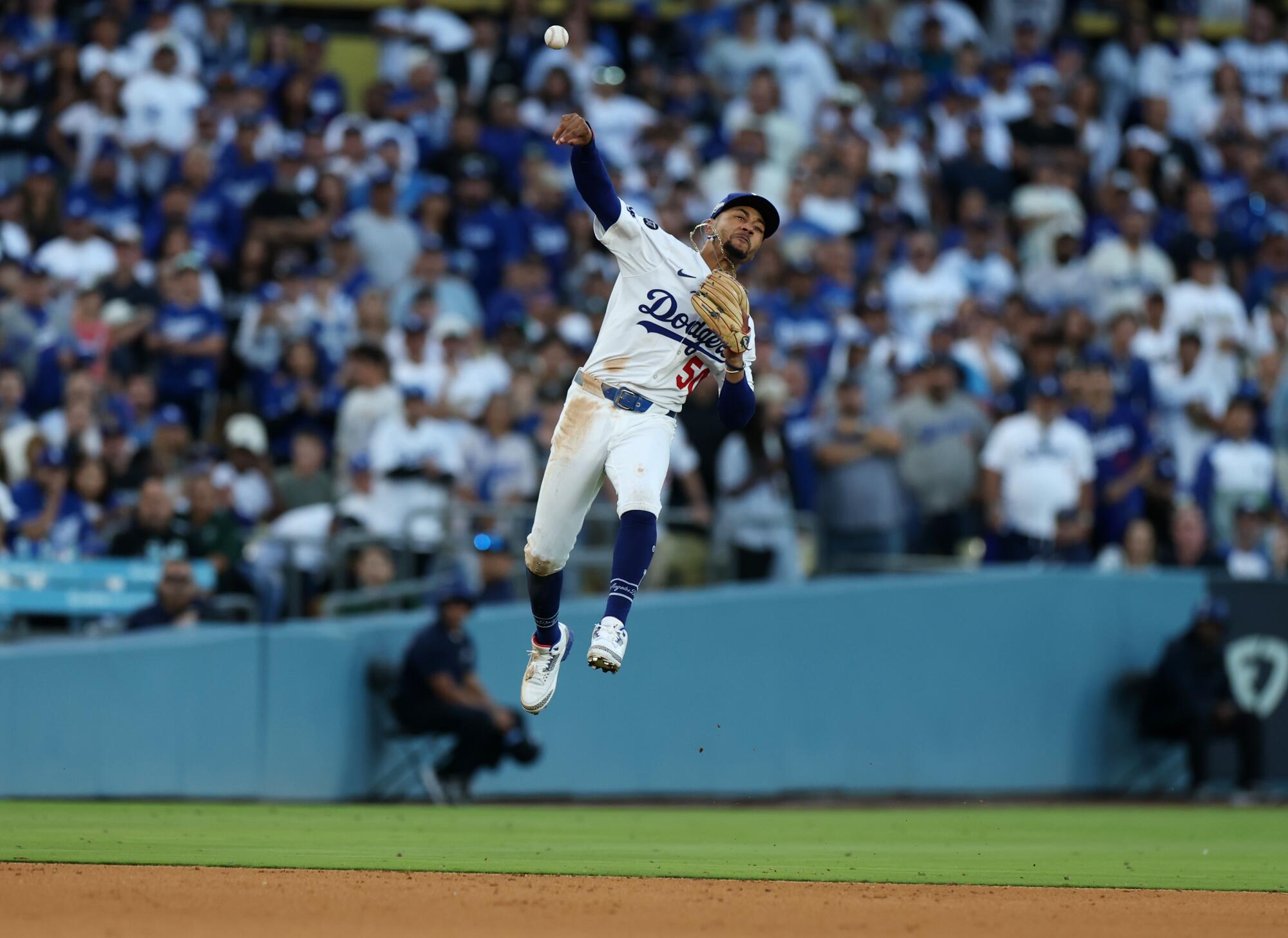Gold Glove finalist Mookie Betts’ fielding (and hitting) has Dodgers in position for sweep
The debate over whether Mookie Betts can play shortstop was settled long ago.
The debate now is whether Mookie Betts can play shortstop better than anyone in baseball. That discussion may soon be drawing to a close, too.
Because a day after being named a finalist for a Gold Glove, Betts put a huge exclamation point on Thursday’s 3-1 playoff win over the Milwaukee Brewers with a spectacular play to start the ninth inning.
The victory leaves the Dodgers a win away from advancing to their second straight World Series, a journey they could complete Friday in Game 4 of the National League Championship Series. And a big reason they’re there is the steady defense of Betts, a six-time Gold Glove winner in the outfield who has made the difficult move to the middle of the infield seem easy.
“I think the only person on this planet that believed that Mookie Betts would be in this conversation was Mookie Betts,” Dodger manager Dave Roberts said. “It’s just something that has never been done. I can’t even — it’s incredible. Obviously I’m at a loss for words.”
Betts tried the position last year but Roberts said the confidence wasn’t there, so he moved Betts back to the outfield. There was no chance that would happen this fall.
Few understand the difficulty of what Betts has done more than those who have played the position. Yet Miguel Rojas, the man Betts replaced at shortstop — and a Gold Glove finalist himself this season as a utility player — said he’s not surprised because he has seen how hard Betts works.
“He doesn’t take days off,” Rojas said of Betts, who is frequently among the first players on the field for pregame drills and among the last to leave. “Even when we have an off day, he’ll still go out there and is asking ways to get better. I think it’s a product of being a relentless worker every single day. He’s never satisfied. He’s always trying to get better.
“For me to be there every single day to watch him perform and watch his work ethic, it’s been impressive.”
Part of that work, Betts said, involves watching video of every fielding play he makes. That includes the brilliant ones, like the ninth-inning play Thursday in which he ranged in the hole to backhand Andrew Vaughn’s grounder, then rose up and delivered a strong one-hop jump throw across his body to first baseman Freddie Freeman to get Vaughn easily.
“I go back and watch all my plays, even the routine ones, just to learn what I can do better,” he said.
Asked if he’s ever surprised by what he sees, Betts, who has yet to make an error in the playoffs, shrugged.
Dodgers shortstop Mookie Betts makes a leaping, cross-body throw to retire Andrew Vaughn at first base during the ninth inning of Game 3 of the NLCS on Thursday at Dodger Stadium.
(Robert Gauthier / Los Angeles Times)
“I’m just doing my job. I’m just doing my job going out there and playing short, that’s all.
“Once I get to the ball, I believe and trust in my athletic ability to make a play.”
Rojas, who has played six positions in the majors, said shortstop is such a hard place to play because of the mental focus it demands. An outfielder might be able to think about his hitting for a few pitches, but the shortstop, who quarterbacks the infield, doesn’t have that luxury.
“In the middle of the year he was in a slump offensively. But he never let the defense down. And that’s really impressive,” Rojas said. “He always said it to me, ‘Even though I’m sucking right now at hitting, I’m never going to be bad at defense. And I’m going to catch every single ball.’
“That’s the mentality that you have to have to be a really good shortstop.”
In the postseason, he’s become a really good offensive shortstop as well. After slumping to a career-low .258 average in the regular season, Betts is slashing .297/.381/.459 and shares the team lead with 11 hits and five extra-base hits in the postseason.
However, the numbers and the awards mean little to him, he said; Betts cares far more about winning. And as for proving himself at shortstop? Others, including his manager, may be surprised, but he isn’t.
“I know I could do it. I believed in myself. I always have belief in myself,” he said. “It was a goal to be the best I could be. If it came with a Gold Glove, cool. If it didn’t come with a Gold Glove, cool.
“I can go to bed at night knowing that I did everything I could. That’s all I care about.”
Just a season ago there were mornings when he’d get out of that bed wishing he could go back to right field. That doesn’t happen anymore.
“I would say the best athletes are the guys in the dirt,” he said. “It was fun while it lasted. I enjoy being in the dirt now.”

